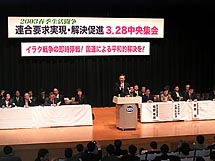Persistent Action for Our Demands
Central Rally Promotes Small to Mid-Sized Unions
(3 April 2003)
 |
| Photo: Pres. Sasamori appeals for an immediate cease-fire in the war on Iraq. (Mar. 28, Tokyo.) |
Representing small to mid-sized unions and the public sector where negotiations are just coming full-swing, RENGO Vice Presidents Koide (JAM [Japanese Association of Metal, Machinery & Manufacturing Workers' Union] President) and Maruyama (KOKKO RENGO [Japan Public Sector Union] President) shared their deep resolutions.
Koide displayed an understanding of the severe times facing small to mid-sized unions saying, "due to the prolonged deflationary economy, the only choice for many small to mid-sized unions are is between jobs and wage cuts." He said these unions should be "seeking to maintain wage curves on the premise of securing employment through sincere labor-management negotiations while effectively utilizing government and related organizations' measures for small to mid-sized businesses."
Then he continued his appeal that "unions with businesses that have favorable balances should receive equivalent amounts to wage curve raises," and that "unions with severe business situations should check their financial health through thorough negotiations. Easy concessions on the part of the unions never makes businesses stable." "Unions suffering wage cuts should try to return to normal as much as possible." He decisively stated that he would continue to strenuously negotiate until the end. Furthermore, he disclosed that he intends to propose settlement guidelines for minimum wage levels after a discussion at the Central Struggle Committee scheduled for April 10.
Maruyama said that, "last year, for the first time in its history, the National Personnel Authority's recommendation for public sector workers annual salaries was a minus figure. We are trapped in a deflationary wage spiral in which decreases in private sector wages result in public servant wage decreases and vice versa. How to break this situation is an issue facing both the public and private sectors. Public and private sectors should tackle this problem in cooperation." At the same time, he asked for understanding and support in their struggle against public servant system reform.
RENGO General Secretary Kusano reported on demand activities served on related ministries, agencies, and employers associations conducted prior to the rally. He said, "we publicly revealed the truth about how union members in workplaces are in trouble and suffering." He unveiled the National Federation of Small Business Associations "pointing out that 'the Ministry of health, Labor and Welfare legislates but only rarely makes that legislation known to anybody or takes action to let people to abide by the laws.'" He continued saying that, "RENGO will continue to urge all related ministries, agencies and organizations to improve and at the same time RENGO will provide full scale backup to struggles in the workplace."
Meanwhile, Democratic Party of Japan Policy Research Committee Chair Edano, Social Democratic Party Leader Doi, Liberal Party Public Relations Committee Chairman Tsuzuki joined the rally to express their solidarity.